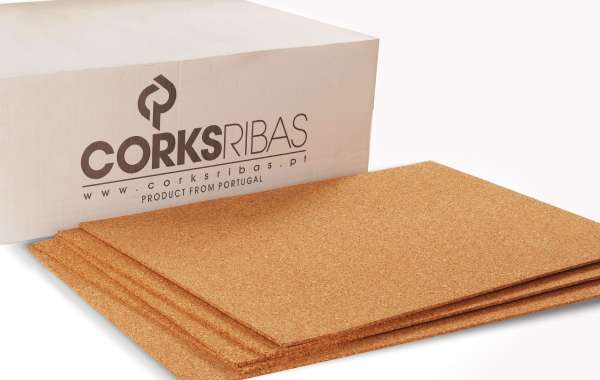Expansion cork is a crucial component in flooring systems, particularly in environments subject to temperature fluctuations. It serves as an effective buffer to prevent damage to floors caused by the natural expansion and contraction of materials. Here’s an in-depth look at how expansion cork works and its benefits in maintaining the integrity of flooring systems.
Understanding Temperature-Induced Floor Damage
- Thermal Expansion and Contraction:
- Temperature Changes: Flooring materials, especially wood and laminate, expand and contract with changes in temperature and humidity.
- Stress and Damage: Without adequate spacing or buffering, this movement can cause stress on the flooring, leading to issues like warping, buckling, or gaps.
- Common Problems:
- Gapping: When floors contract due to cold temperatures, gaps can appear between planks.
- Buckling: Expansion in warm temperatures can cause the flooring to push against walls or other planks, leading to buckling or lifting.
- Cracking: Repeated cycles of expansion and contraction can weaken the flooring material, resulting in cracks.
How Expansion Cork Helps
- Elasticity and Compressibility:
- Natural Properties: Cork is naturally elastic and compressible, allowing it to absorb and accommodate the movement of flooring materials.
- Flexibility: As temperatures change, cork can expand and contract without losing its shape or integrity, making it an ideal buffer.
- Installation Methods:
- Expansion Joints: Cork strips or sheets are installed in expansion joints around the perimeter of the room or in specific areas prone to movement.
- Underlayment: Cork underlayment is placed beneath the flooring to provide a continuous buffer that absorbs movement and reduces stress on the flooring material.
- Temperature Regulation:
- Thermal Insulation: Cork’s insulating properties help moderate temperature changes, reducing the extent of expansion and contraction in the flooring materials.
- Consistent Environment: By maintaining a more stable temperature, cork helps to minimize the overall movement of the flooring.
Benefits of Using Expansion Cork
- Prevention of Floor Damage:
- Warping and Buckling: By absorbing and accommodating movement, cork helps prevent the warping and buckling of floors.
- Cracking and Splitting: Reduces the risk of cracking and splitting caused by repeated expansion and contraction cycles.
- Prolonged Flooring Lifespan:
- Durability: Protects the structural integrity of the flooring, thereby extending its lifespan.
- Maintenance: Reduces the need for frequent repairs or replacements, leading to lower maintenance costs over time.
- Improved Comfort and Performance:
- Sound Insulation: Cork also provides excellent sound insulation, reducing noise transmission between floors.
- Thermal Comfort: Enhances the thermal comfort of the room by acting as a natural insulator, keeping floors warmer in winter and cooler in summer.
- Eco-Friendly Solution:
- Sustainability: Cork is a renewable resource, harvested from the bark of cork oak trees without harming the tree, making it an environmentally friendly choice.
- Biodegradability: Cork is biodegradable, contributing to a reduced environmental footprint.
Practical Applications
- Residential Flooring:
- Living Areas: Ideal for living rooms, bedrooms, and kitchens where temperature changes are common.
- Basements: Helps manage the higher humidity levels often found in basements, preventing moisture-related expansion and contraction.
- Commercial Spaces:
- Offices and Retail: Suitable for commercial spaces where large areas of flooring are installed and temperature regulation is essential.
- Public Buildings: Ensures long-lasting and durable flooring in schools, hospitals, and other public buildings.
- Specialized Environments:
- Sports Facilities: Used in gymnasiums and sports facilities where the flooring undergoes significant stress and temperature variation.
- Recording Studios: Enhances sound insulation while preventing floor damage in recording and broadcasting studios.
Installation Tips
- Professional Installation:
- Expertise Required: While some DIY enthusiasts may attempt installation, professional installation is recommended to ensure proper placement and effectiveness.
- Precise Placement: Accurate measurement and placement of expansion joints and underlayment are crucial for optimal performance.
- Regular Maintenance:
- Inspection: Periodically inspect the expansion cork for signs of wear or damage, and replace as necessary to maintain effectiveness.
- Cleaning: Keep the cork clean and free from debris to ensure it continues to function properly.
Expansion cork is an essential component in modern flooring systems, offering a flexible, durable, and eco-friendly solution to the challenges posed by temperature changes. By preventing damage such as warping, buckling, and cracking, expansion cork ensures the longevity and performance of your flooring, whether in residential, commercial, or specialized environments. Investing in expansion cork not only protects your floors but also enhances the overall comfort and sustainability of your living or working space.








